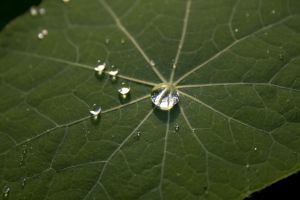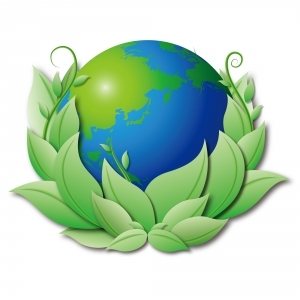Gutters are designed to accomplish many things for your home. They channel water away from the house. They protect your home’s foundation. They guard against destruction of landscaping near your home. But did you know that gutters can also help you to adopt a greener, healthier lifestyle?

Here are five examples of how gutters can improve both your health and the environment.
1. Make sure they’re made of recyclable materials. Aluminum, copper, and galvanized steel can not only be manufactured out of recycled metals, but also be used as scrap to make new gutters at the end of their lifespan. The same goes for wooden gutters, which can be chopped into wood chips and recycled in future wood products. Conversely, gutters made of plastic, vinyl, or PVC piping are not recyclable; plus, they’re not very durable and tend to crack in extreme temperatures.
2. Use them for garden irrigation. Gutters are engineered specifically to channel water from one place to another — so why not make your garden their termination point? Instead of a regular downspout on the side of your home, you can extend the guttering across a space or yard all the way to your garden. You can even “stairstep” gutter sections so the water drops down several inches as it flows. Just don’t put your garden too close to your home; otherwise, you might experience foundation problems from seeping water that gutters are supposed to help you avoid.

3. Use them as the “bridge” to your rainwater harvesting system. Instead of having your gutters direct water into your yard, the sewer, or an alley, install a rain barrel or other storage container to collect the rainwater. The easiest way is to cut off the last several feet of your downspout and place the collection tank underneath the new opening. Harvested rainwater can be used for washing cars, watering landscaping, or even cleaning clothes and flushing toilets. Recycling rainwater is one of the greenest things you can do as a homeowner.
4. Clean your gutters — and clean your water. Sure, you probably hate gutter cleaning. But were you aware that keeping your gutters clog-free also improves the quality of the water? In addition to leaves and pine needles, gutter debris is also made up of animal feces, which contains elements that contribute to the formation of algae in bodies of water. This algae inhibits the ecosystem of plant and animal life. Therefore, minimizing the presence of these harmful substances helps keep the water cleaner.
5. Use them for gutter gardens. Gutters can be eco-friendly even when they’re not attached to your home. Plenty of people have used gutter sections to house gardens, especially in areas like apartment balconies or condominium patios where space is an issue. Just take five- or ten-foot gutter sections, cap the ends, and fill them with soil and seeds. You can set the gutter gardens on windowsills, affix them to siding, or even hang them from chains attached to a patio ceiling. They’re perfect for growing herbs, flowers, or even small vegetables.

